Health Inequality Report: Factors and Influences on Health Disparities
VerifiedAdded on 2020/12/09
|9
|2288
|100
Report
AI Summary
This report provides a comprehensive overview of health inequality, examining its definition, causes, and influencing factors. It delves into the roles of sociological and psychological theories in understanding health disparities, emphasizing how social factors like poverty and lack of awareness, and psychological factors such as gender differences and discrimination, contribute to unequal health outcomes. The report highlights the importance of addressing these factors through national and local interventions, including poverty reduction, increased awareness campaigns, and the elimination of discrimination. It concludes by emphasizing the need for effective measures to reduce health inequalities and ensure equitable access to healthcare. The report also discusses the impact of health inequalities on individual well-being, social cohesion, and the overall health of the population, advocating for policies and practices that promote social justice and improve health outcomes for all individuals.

Referral individual
Educational Leaflet (1)
Educational Leaflet (1)
Paraphrase This Document
Need a fresh take? Get an instant paraphrase of this document with our AI Paraphraser
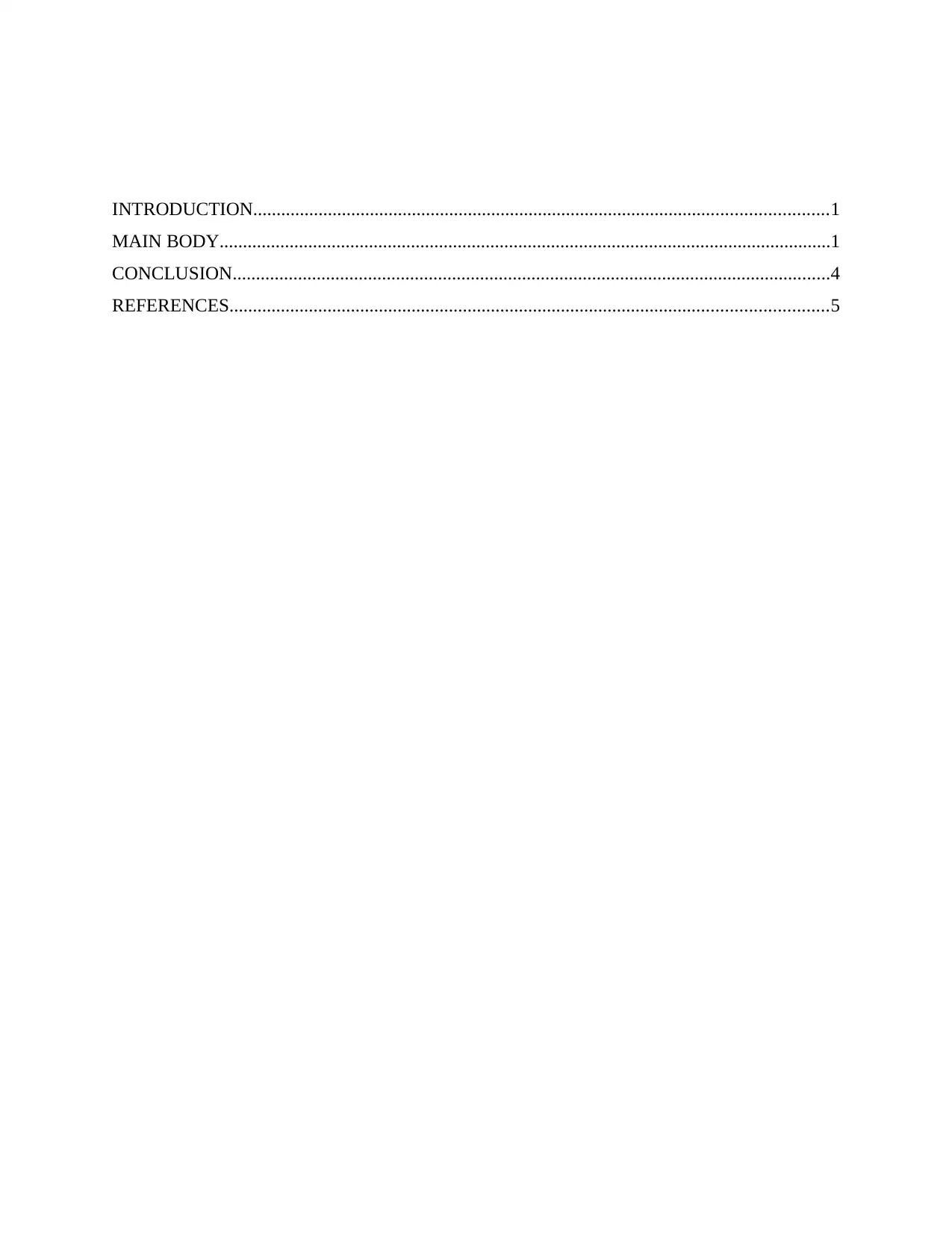
INTRODUCTION...........................................................................................................................1
MAIN BODY...................................................................................................................................1
CONCLUSION................................................................................................................................4
REFERENCES................................................................................................................................5
MAIN BODY...................................................................................................................................1
CONCLUSION................................................................................................................................4
REFERENCES................................................................................................................................5

⊘ This is a preview!⊘
Do you want full access?
Subscribe today to unlock all pages.

Trusted by 1+ million students worldwide
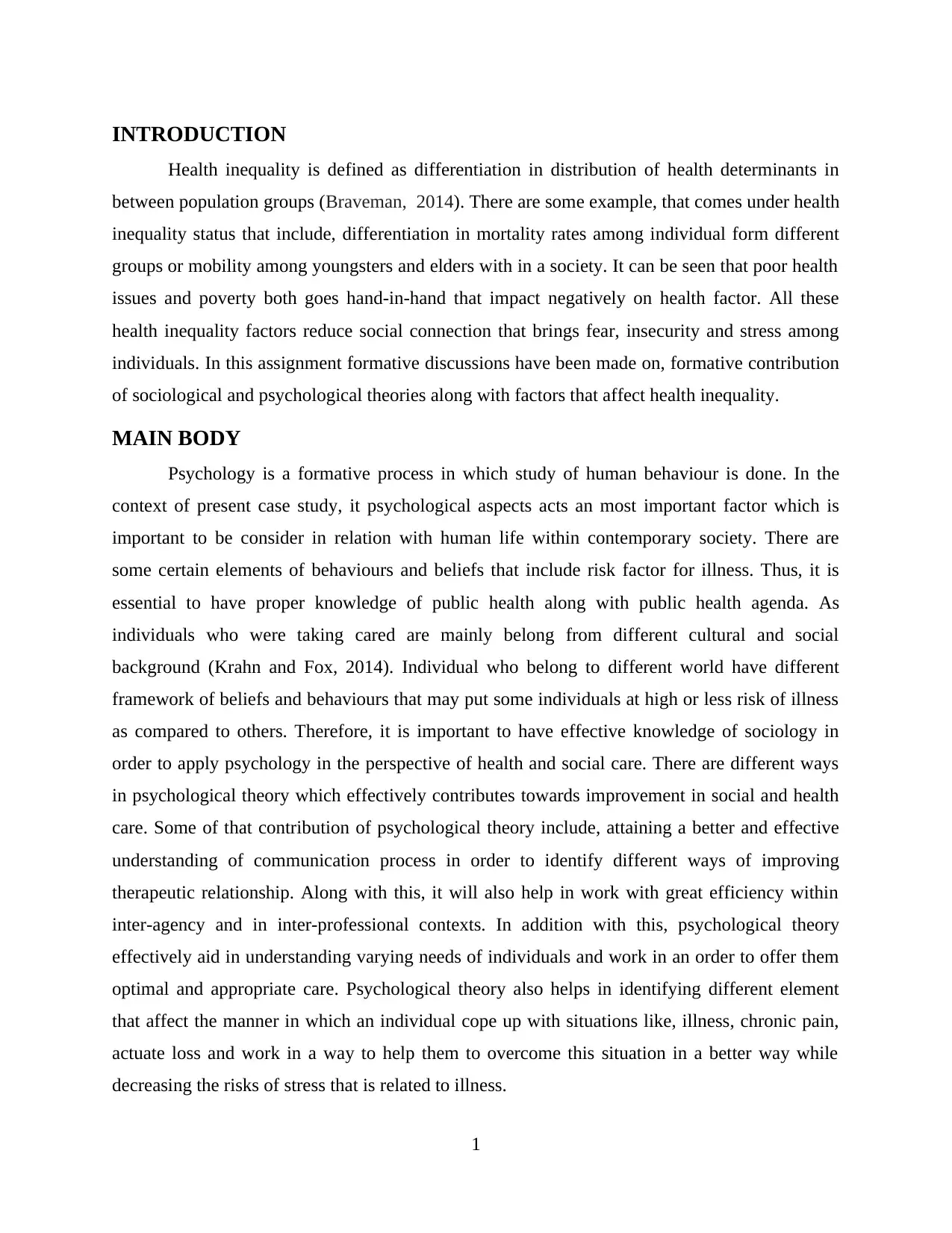
INTRODUCTION
Health inequality is defined as differentiation in distribution of health determinants in
between population groups (Braveman, 2014). There are some example, that comes under health
inequality status that include, differentiation in mortality rates among individual form different
groups or mobility among youngsters and elders with in a society. It can be seen that poor health
issues and poverty both goes hand-in-hand that impact negatively on health factor. All these
health inequality factors reduce social connection that brings fear, insecurity and stress among
individuals. In this assignment formative discussions have been made on, formative contribution
of sociological and psychological theories along with factors that affect health inequality.
MAIN BODY
Psychology is a formative process in which study of human behaviour is done. In the
context of present case study, it psychological aspects acts an most important factor which is
important to be consider in relation with human life within contemporary society. There are
some certain elements of behaviours and beliefs that include risk factor for illness. Thus, it is
essential to have proper knowledge of public health along with public health agenda. As
individuals who were taking cared are mainly belong from different cultural and social
background (Krahn and Fox, 2014). Individual who belong to different world have different
framework of beliefs and behaviours that may put some individuals at high or less risk of illness
as compared to others. Therefore, it is important to have effective knowledge of sociology in
order to apply psychology in the perspective of health and social care. There are different ways
in psychological theory which effectively contributes towards improvement in social and health
care. Some of that contribution of psychological theory include, attaining a better and effective
understanding of communication process in order to identify different ways of improving
therapeutic relationship. Along with this, it will also help in work with great efficiency within
inter-agency and in inter-professional contexts. In addition with this, psychological theory
effectively aid in understanding varying needs of individuals and work in an order to offer them
optimal and appropriate care. Psychological theory also helps in identifying different element
that affect the manner in which an individual cope up with situations like, illness, chronic pain,
actuate loss and work in a way to help them to overcome this situation in a better way while
decreasing the risks of stress that is related to illness.
1
Health inequality is defined as differentiation in distribution of health determinants in
between population groups (Braveman, 2014). There are some example, that comes under health
inequality status that include, differentiation in mortality rates among individual form different
groups or mobility among youngsters and elders with in a society. It can be seen that poor health
issues and poverty both goes hand-in-hand that impact negatively on health factor. All these
health inequality factors reduce social connection that brings fear, insecurity and stress among
individuals. In this assignment formative discussions have been made on, formative contribution
of sociological and psychological theories along with factors that affect health inequality.
MAIN BODY
Psychology is a formative process in which study of human behaviour is done. In the
context of present case study, it psychological aspects acts an most important factor which is
important to be consider in relation with human life within contemporary society. There are
some certain elements of behaviours and beliefs that include risk factor for illness. Thus, it is
essential to have proper knowledge of public health along with public health agenda. As
individuals who were taking cared are mainly belong from different cultural and social
background (Krahn and Fox, 2014). Individual who belong to different world have different
framework of beliefs and behaviours that may put some individuals at high or less risk of illness
as compared to others. Therefore, it is important to have effective knowledge of sociology in
order to apply psychology in the perspective of health and social care. There are different ways
in psychological theory which effectively contributes towards improvement in social and health
care. Some of that contribution of psychological theory include, attaining a better and effective
understanding of communication process in order to identify different ways of improving
therapeutic relationship. Along with this, it will also help in work with great efficiency within
inter-agency and in inter-professional contexts. In addition with this, psychological theory
effectively aid in understanding varying needs of individuals and work in an order to offer them
optimal and appropriate care. Psychological theory also helps in identifying different element
that affect the manner in which an individual cope up with situations like, illness, chronic pain,
actuate loss and work in a way to help them to overcome this situation in a better way while
decreasing the risks of stress that is related to illness.
1
Paraphrase This Document
Need a fresh take? Get an instant paraphrase of this document with our AI Paraphraser
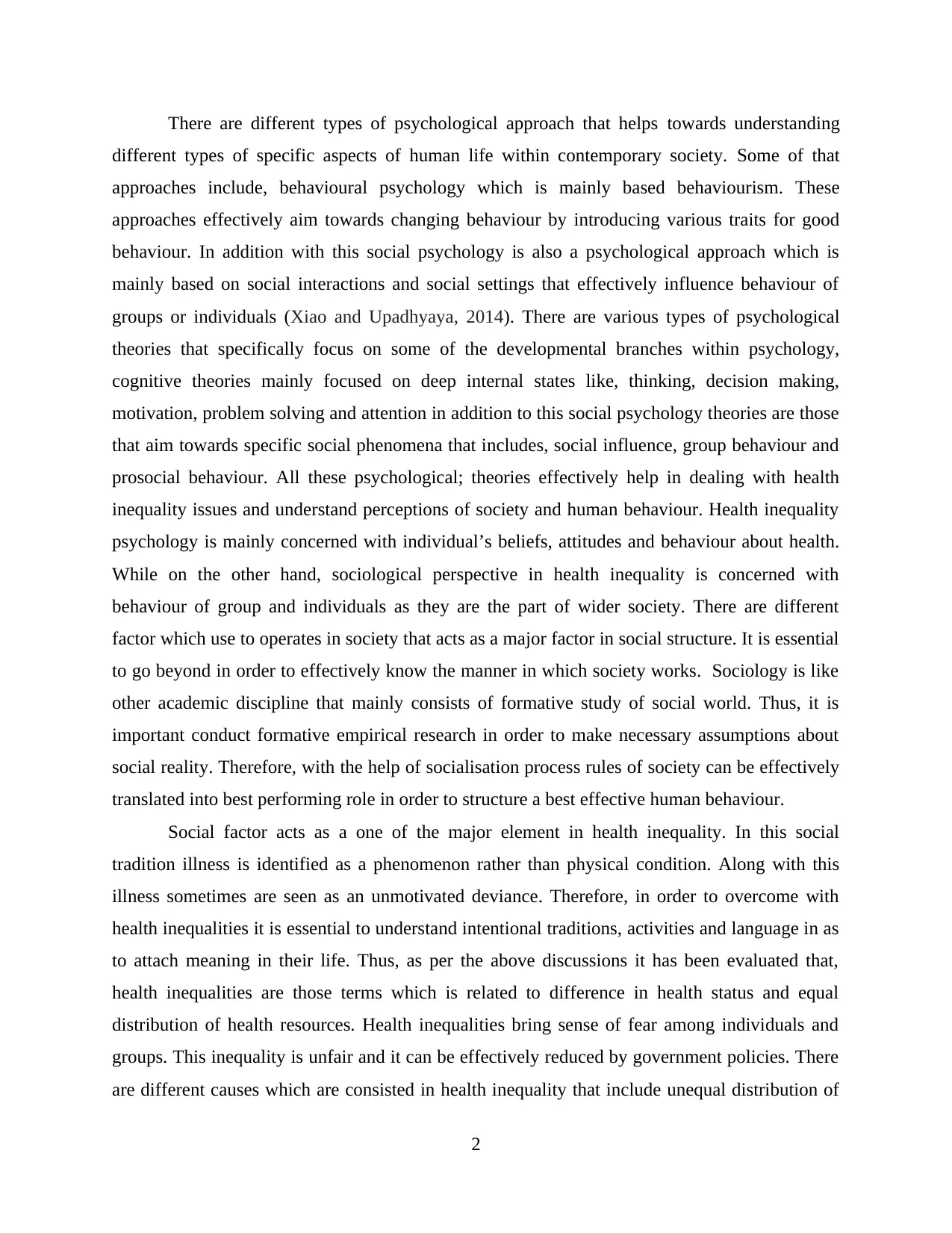
There are different types of psychological approach that helps towards understanding
different types of specific aspects of human life within contemporary society. Some of that
approaches include, behavioural psychology which is mainly based behaviourism. These
approaches effectively aim towards changing behaviour by introducing various traits for good
behaviour. In addition with this social psychology is also a psychological approach which is
mainly based on social interactions and social settings that effectively influence behaviour of
groups or individuals (Xiao and Upadhyaya, 2014). There are various types of psychological
theories that specifically focus on some of the developmental branches within psychology,
cognitive theories mainly focused on deep internal states like, thinking, decision making,
motivation, problem solving and attention in addition to this social psychology theories are those
that aim towards specific social phenomena that includes, social influence, group behaviour and
prosocial behaviour. All these psychological; theories effectively help in dealing with health
inequality issues and understand perceptions of society and human behaviour. Health inequality
psychology is mainly concerned with individual’s beliefs, attitudes and behaviour about health.
While on the other hand, sociological perspective in health inequality is concerned with
behaviour of group and individuals as they are the part of wider society. There are different
factor which use to operates in society that acts as a major factor in social structure. It is essential
to go beyond in order to effectively know the manner in which society works. Sociology is like
other academic discipline that mainly consists of formative study of social world. Thus, it is
important conduct formative empirical research in order to make necessary assumptions about
social reality. Therefore, with the help of socialisation process rules of society can be effectively
translated into best performing role in order to structure a best effective human behaviour.
Social factor acts as a one of the major element in health inequality. In this social
tradition illness is identified as a phenomenon rather than physical condition. Along with this
illness sometimes are seen as an unmotivated deviance. Therefore, in order to overcome with
health inequalities it is essential to understand intentional traditions, activities and language in as
to attach meaning in their life. Thus, as per the above discussions it has been evaluated that,
health inequalities are those terms which is related to difference in health status and equal
distribution of health resources. Health inequalities bring sense of fear among individuals and
groups. This inequality is unfair and it can be effectively reduced by government policies. There
are different causes which are consisted in health inequality that include unequal distribution of
2
different types of specific aspects of human life within contemporary society. Some of that
approaches include, behavioural psychology which is mainly based behaviourism. These
approaches effectively aim towards changing behaviour by introducing various traits for good
behaviour. In addition with this social psychology is also a psychological approach which is
mainly based on social interactions and social settings that effectively influence behaviour of
groups or individuals (Xiao and Upadhyaya, 2014). There are various types of psychological
theories that specifically focus on some of the developmental branches within psychology,
cognitive theories mainly focused on deep internal states like, thinking, decision making,
motivation, problem solving and attention in addition to this social psychology theories are those
that aim towards specific social phenomena that includes, social influence, group behaviour and
prosocial behaviour. All these psychological; theories effectively help in dealing with health
inequality issues and understand perceptions of society and human behaviour. Health inequality
psychology is mainly concerned with individual’s beliefs, attitudes and behaviour about health.
While on the other hand, sociological perspective in health inequality is concerned with
behaviour of group and individuals as they are the part of wider society. There are different
factor which use to operates in society that acts as a major factor in social structure. It is essential
to go beyond in order to effectively know the manner in which society works. Sociology is like
other academic discipline that mainly consists of formative study of social world. Thus, it is
important conduct formative empirical research in order to make necessary assumptions about
social reality. Therefore, with the help of socialisation process rules of society can be effectively
translated into best performing role in order to structure a best effective human behaviour.
Social factor acts as a one of the major element in health inequality. In this social
tradition illness is identified as a phenomenon rather than physical condition. Along with this
illness sometimes are seen as an unmotivated deviance. Therefore, in order to overcome with
health inequalities it is essential to understand intentional traditions, activities and language in as
to attach meaning in their life. Thus, as per the above discussions it has been evaluated that,
health inequalities are those terms which is related to difference in health status and equal
distribution of health resources. Health inequalities bring sense of fear among individuals and
groups. This inequality is unfair and it can be effectively reduced by government policies. There
are different causes which are consisted in health inequality that include unequal distribution of
2
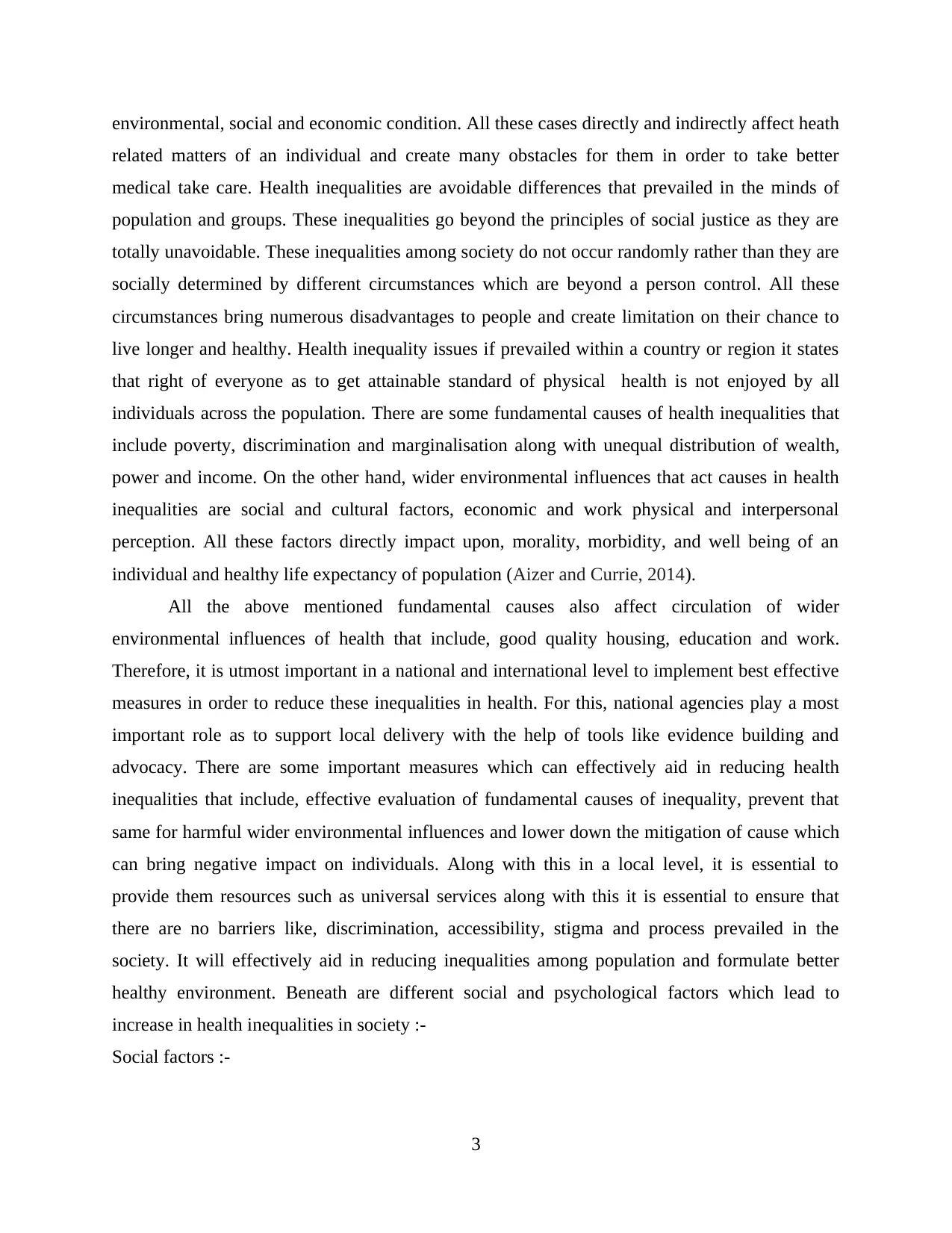
environmental, social and economic condition. All these cases directly and indirectly affect heath
related matters of an individual and create many obstacles for them in order to take better
medical take care. Health inequalities are avoidable differences that prevailed in the minds of
population and groups. These inequalities go beyond the principles of social justice as they are
totally unavoidable. These inequalities among society do not occur randomly rather than they are
socially determined by different circumstances which are beyond a person control. All these
circumstances bring numerous disadvantages to people and create limitation on their chance to
live longer and healthy. Health inequality issues if prevailed within a country or region it states
that right of everyone as to get attainable standard of physical health is not enjoyed by all
individuals across the population. There are some fundamental causes of health inequalities that
include poverty, discrimination and marginalisation along with unequal distribution of wealth,
power and income. On the other hand, wider environmental influences that act causes in health
inequalities are social and cultural factors, economic and work physical and interpersonal
perception. All these factors directly impact upon, morality, morbidity, and well being of an
individual and healthy life expectancy of population (Aizer and Currie, 2014).
All the above mentioned fundamental causes also affect circulation of wider
environmental influences of health that include, good quality housing, education and work.
Therefore, it is utmost important in a national and international level to implement best effective
measures in order to reduce these inequalities in health. For this, national agencies play a most
important role as to support local delivery with the help of tools like evidence building and
advocacy. There are some important measures which can effectively aid in reducing health
inequalities that include, effective evaluation of fundamental causes of inequality, prevent that
same for harmful wider environmental influences and lower down the mitigation of cause which
can bring negative impact on individuals. Along with this in a local level, it is essential to
provide them resources such as universal services along with this it is essential to ensure that
there are no barriers like, discrimination, accessibility, stigma and process prevailed in the
society. It will effectively aid in reducing inequalities among population and formulate better
healthy environment. Beneath are different social and psychological factors which lead to
increase in health inequalities in society :-
Social factors :-
3
related matters of an individual and create many obstacles for them in order to take better
medical take care. Health inequalities are avoidable differences that prevailed in the minds of
population and groups. These inequalities go beyond the principles of social justice as they are
totally unavoidable. These inequalities among society do not occur randomly rather than they are
socially determined by different circumstances which are beyond a person control. All these
circumstances bring numerous disadvantages to people and create limitation on their chance to
live longer and healthy. Health inequality issues if prevailed within a country or region it states
that right of everyone as to get attainable standard of physical health is not enjoyed by all
individuals across the population. There are some fundamental causes of health inequalities that
include poverty, discrimination and marginalisation along with unequal distribution of wealth,
power and income. On the other hand, wider environmental influences that act causes in health
inequalities are social and cultural factors, economic and work physical and interpersonal
perception. All these factors directly impact upon, morality, morbidity, and well being of an
individual and healthy life expectancy of population (Aizer and Currie, 2014).
All the above mentioned fundamental causes also affect circulation of wider
environmental influences of health that include, good quality housing, education and work.
Therefore, it is utmost important in a national and international level to implement best effective
measures in order to reduce these inequalities in health. For this, national agencies play a most
important role as to support local delivery with the help of tools like evidence building and
advocacy. There are some important measures which can effectively aid in reducing health
inequalities that include, effective evaluation of fundamental causes of inequality, prevent that
same for harmful wider environmental influences and lower down the mitigation of cause which
can bring negative impact on individuals. Along with this in a local level, it is essential to
provide them resources such as universal services along with this it is essential to ensure that
there are no barriers like, discrimination, accessibility, stigma and process prevailed in the
society. It will effectively aid in reducing inequalities among population and formulate better
healthy environment. Beneath are different social and psychological factors which lead to
increase in health inequalities in society :-
Social factors :-
3
⊘ This is a preview!⊘
Do you want full access?
Subscribe today to unlock all pages.

Trusted by 1+ million students worldwide
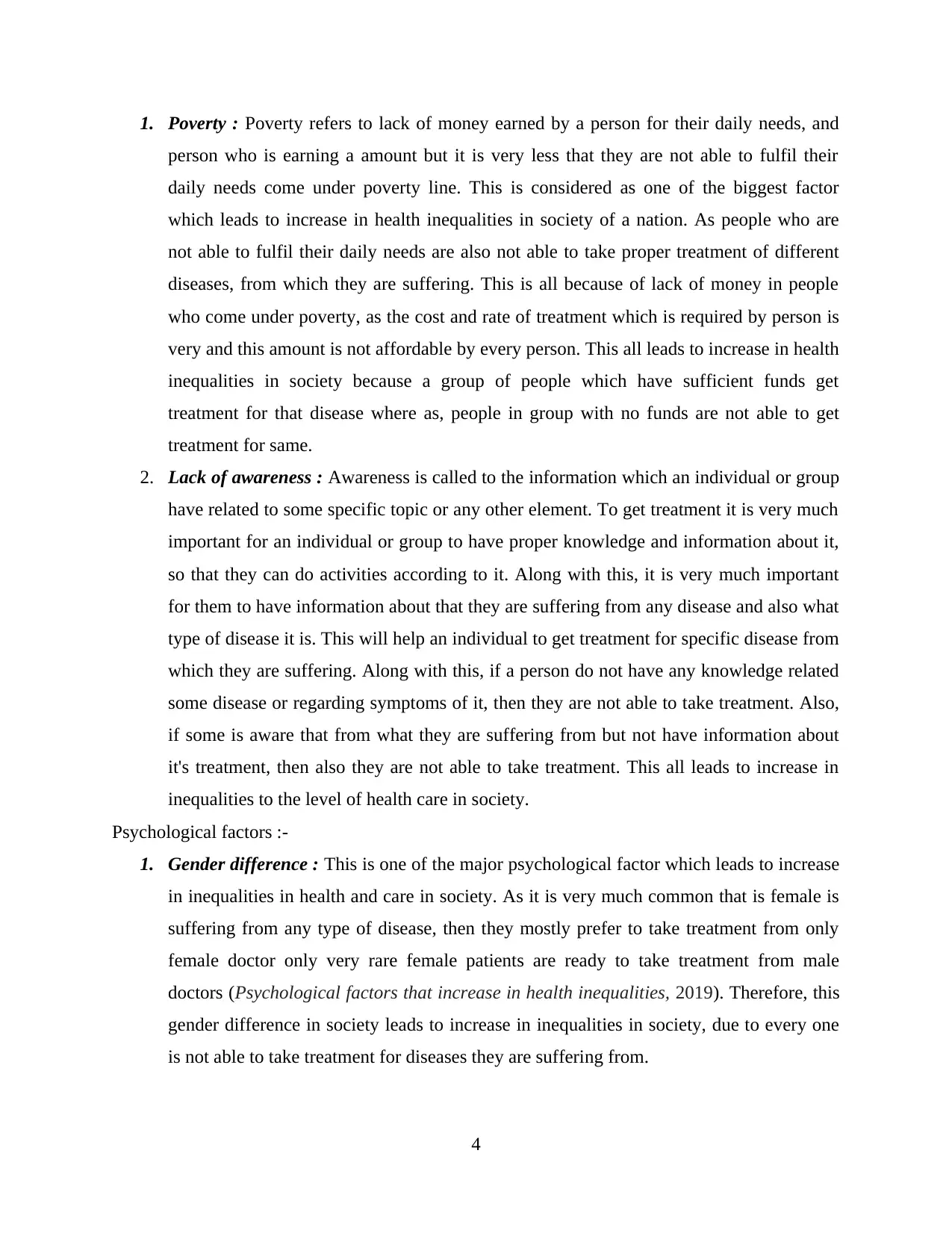
1. Poverty : Poverty refers to lack of money earned by a person for their daily needs, and
person who is earning a amount but it is very less that they are not able to fulfil their
daily needs come under poverty line. This is considered as one of the biggest factor
which leads to increase in health inequalities in society of a nation. As people who are
not able to fulfil their daily needs are also not able to take proper treatment of different
diseases, from which they are suffering. This is all because of lack of money in people
who come under poverty, as the cost and rate of treatment which is required by person is
very and this amount is not affordable by every person. This all leads to increase in health
inequalities in society because a group of people which have sufficient funds get
treatment for that disease where as, people in group with no funds are not able to get
treatment for same.
2. Lack of awareness : Awareness is called to the information which an individual or group
have related to some specific topic or any other element. To get treatment it is very much
important for an individual or group to have proper knowledge and information about it,
so that they can do activities according to it. Along with this, it is very much important
for them to have information about that they are suffering from any disease and also what
type of disease it is. This will help an individual to get treatment for specific disease from
which they are suffering. Along with this, if a person do not have any knowledge related
some disease or regarding symptoms of it, then they are not able to take treatment. Also,
if some is aware that from what they are suffering from but not have information about
it's treatment, then also they are not able to take treatment. This all leads to increase in
inequalities to the level of health care in society.
Psychological factors :-
1. Gender difference : This is one of the major psychological factor which leads to increase
in inequalities in health and care in society. As it is very much common that is female is
suffering from any type of disease, then they mostly prefer to take treatment from only
female doctor only very rare female patients are ready to take treatment from male
doctors (Psychological factors that increase in health inequalities, 2019). Therefore, this
gender difference in society leads to increase in inequalities in society, due to every one
is not able to take treatment for diseases they are suffering from.
4
person who is earning a amount but it is very less that they are not able to fulfil their
daily needs come under poverty line. This is considered as one of the biggest factor
which leads to increase in health inequalities in society of a nation. As people who are
not able to fulfil their daily needs are also not able to take proper treatment of different
diseases, from which they are suffering. This is all because of lack of money in people
who come under poverty, as the cost and rate of treatment which is required by person is
very and this amount is not affordable by every person. This all leads to increase in health
inequalities in society because a group of people which have sufficient funds get
treatment for that disease where as, people in group with no funds are not able to get
treatment for same.
2. Lack of awareness : Awareness is called to the information which an individual or group
have related to some specific topic or any other element. To get treatment it is very much
important for an individual or group to have proper knowledge and information about it,
so that they can do activities according to it. Along with this, it is very much important
for them to have information about that they are suffering from any disease and also what
type of disease it is. This will help an individual to get treatment for specific disease from
which they are suffering. Along with this, if a person do not have any knowledge related
some disease or regarding symptoms of it, then they are not able to take treatment. Also,
if some is aware that from what they are suffering from but not have information about
it's treatment, then also they are not able to take treatment. This all leads to increase in
inequalities to the level of health care in society.
Psychological factors :-
1. Gender difference : This is one of the major psychological factor which leads to increase
in inequalities in health and care in society. As it is very much common that is female is
suffering from any type of disease, then they mostly prefer to take treatment from only
female doctor only very rare female patients are ready to take treatment from male
doctors (Psychological factors that increase in health inequalities, 2019). Therefore, this
gender difference in society leads to increase in inequalities in society, due to every one
is not able to take treatment for diseases they are suffering from.
4
Paraphrase This Document
Need a fresh take? Get an instant paraphrase of this document with our AI Paraphraser
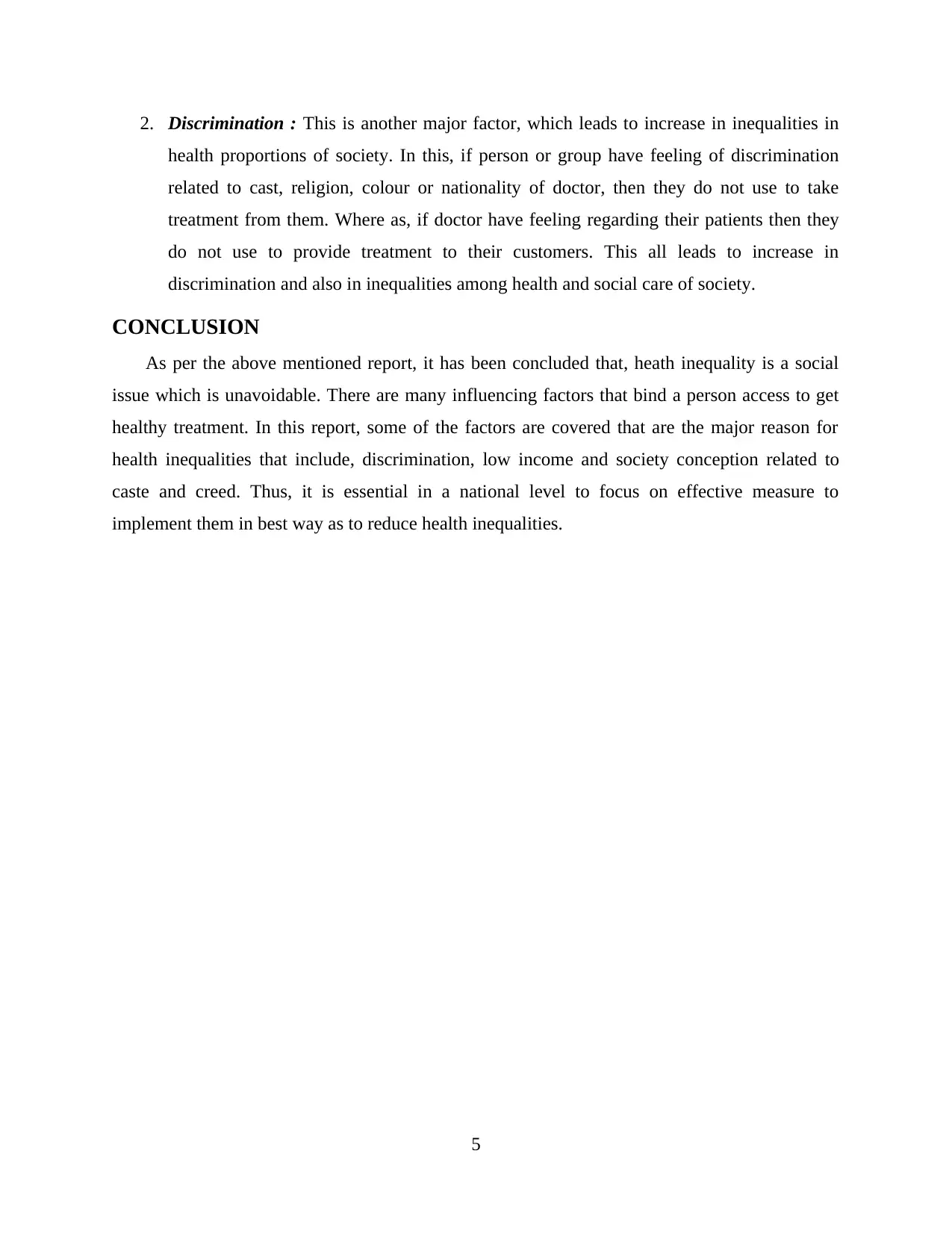
2. Discrimination : This is another major factor, which leads to increase in inequalities in
health proportions of society. In this, if person or group have feeling of discrimination
related to cast, religion, colour or nationality of doctor, then they do not use to take
treatment from them. Where as, if doctor have feeling regarding their patients then they
do not use to provide treatment to their customers. This all leads to increase in
discrimination and also in inequalities among health and social care of society.
CONCLUSION
As per the above mentioned report, it has been concluded that, heath inequality is a social
issue which is unavoidable. There are many influencing factors that bind a person access to get
healthy treatment. In this report, some of the factors are covered that are the major reason for
health inequalities that include, discrimination, low income and society conception related to
caste and creed. Thus, it is essential in a national level to focus on effective measure to
implement them in best way as to reduce health inequalities.
5
health proportions of society. In this, if person or group have feeling of discrimination
related to cast, religion, colour or nationality of doctor, then they do not use to take
treatment from them. Where as, if doctor have feeling regarding their patients then they
do not use to provide treatment to their customers. This all leads to increase in
discrimination and also in inequalities among health and social care of society.
CONCLUSION
As per the above mentioned report, it has been concluded that, heath inequality is a social
issue which is unavoidable. There are many influencing factors that bind a person access to get
healthy treatment. In this report, some of the factors are covered that are the major reason for
health inequalities that include, discrimination, low income and society conception related to
caste and creed. Thus, it is essential in a national level to focus on effective measure to
implement them in best way as to reduce health inequalities.
5
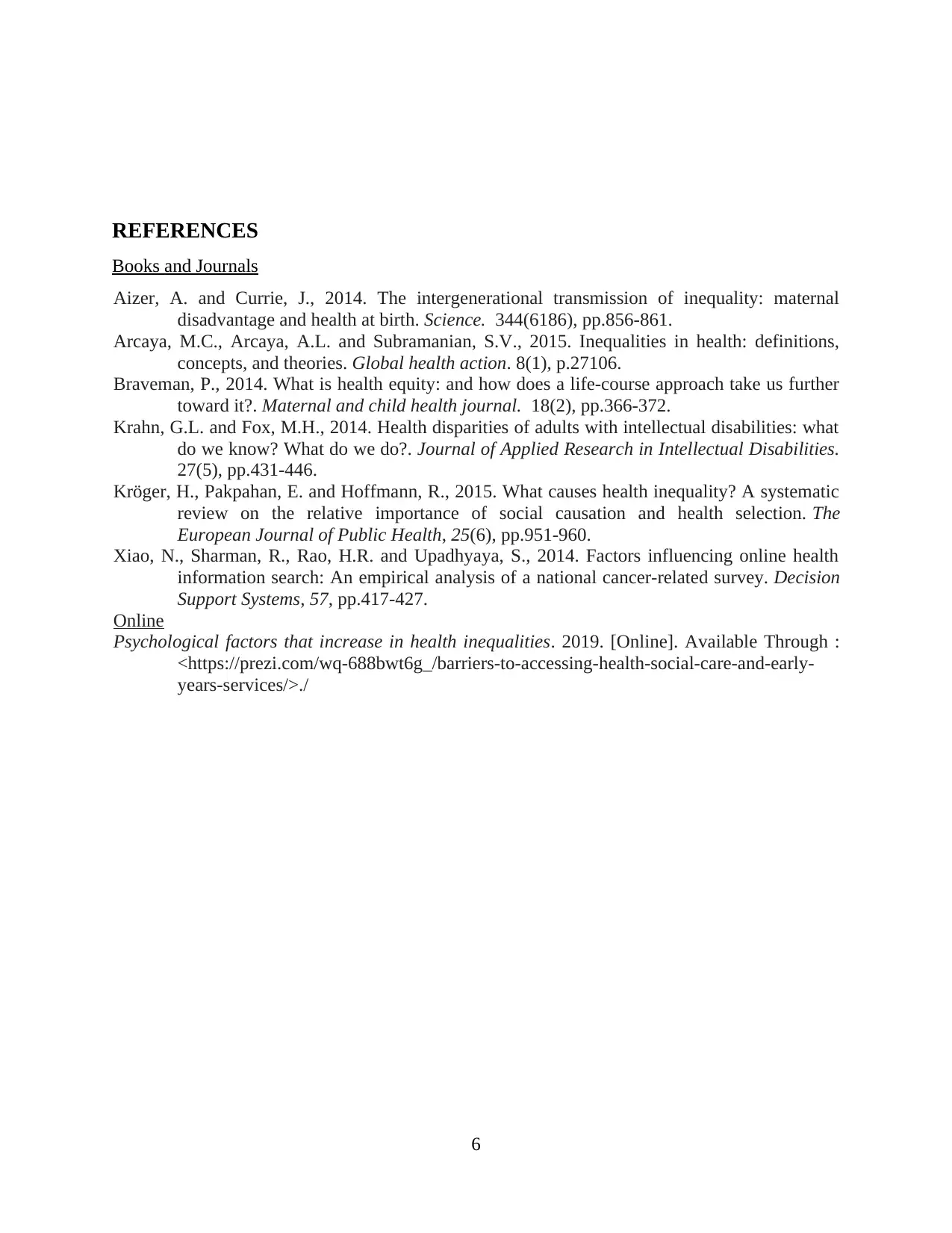
REFERENCES
Books and Journals
Aizer, A. and Currie, J., 2014. The intergenerational transmission of inequality: maternal
disadvantage and health at birth. Science. 344(6186), pp.856-861.
Arcaya, M.C., Arcaya, A.L. and Subramanian, S.V., 2015. Inequalities in health: definitions,
concepts, and theories. Global health action. 8(1), p.27106.
Braveman, P., 2014. What is health equity: and how does a life-course approach take us further
toward it?. Maternal and child health journal. 18(2), pp.366-372.
Krahn, G.L. and Fox, M.H., 2014. Health disparities of adults with intellectual disabilities: what
do we know? What do we do?. Journal of Applied Research in Intellectual Disabilities.
27(5), pp.431-446.
Kröger, H., Pakpahan, E. and Hoffmann, R., 2015. What causes health inequality? A systematic
review on the relative importance of social causation and health selection. The
European Journal of Public Health, 25(6), pp.951-960.
Xiao, N., Sharman, R., Rao, H.R. and Upadhyaya, S., 2014. Factors influencing online health
information search: An empirical analysis of a national cancer-related survey. Decision
Support Systems, 57, pp.417-427.
Online
Psychological factors that increase in health inequalities. 2019. [Online]. Available Through :
<https://prezi.com/wq-688bwt6g_/barriers-to-accessing-health-social-care-and-early-
years-services/>./
6
Books and Journals
Aizer, A. and Currie, J., 2014. The intergenerational transmission of inequality: maternal
disadvantage and health at birth. Science. 344(6186), pp.856-861.
Arcaya, M.C., Arcaya, A.L. and Subramanian, S.V., 2015. Inequalities in health: definitions,
concepts, and theories. Global health action. 8(1), p.27106.
Braveman, P., 2014. What is health equity: and how does a life-course approach take us further
toward it?. Maternal and child health journal. 18(2), pp.366-372.
Krahn, G.L. and Fox, M.H., 2014. Health disparities of adults with intellectual disabilities: what
do we know? What do we do?. Journal of Applied Research in Intellectual Disabilities.
27(5), pp.431-446.
Kröger, H., Pakpahan, E. and Hoffmann, R., 2015. What causes health inequality? A systematic
review on the relative importance of social causation and health selection. The
European Journal of Public Health, 25(6), pp.951-960.
Xiao, N., Sharman, R., Rao, H.R. and Upadhyaya, S., 2014. Factors influencing online health
information search: An empirical analysis of a national cancer-related survey. Decision
Support Systems, 57, pp.417-427.
Online
Psychological factors that increase in health inequalities. 2019. [Online]. Available Through :
<https://prezi.com/wq-688bwt6g_/barriers-to-accessing-health-social-care-and-early-
years-services/>./
6
⊘ This is a preview!⊘
Do you want full access?
Subscribe today to unlock all pages.

Trusted by 1+ million students worldwide
1 out of 9
Related Documents
Your All-in-One AI-Powered Toolkit for Academic Success.
+13062052269
info@desklib.com
Available 24*7 on WhatsApp / Email
![[object Object]](/_next/static/media/star-bottom.7253800d.svg)
Unlock your academic potential
Copyright © 2020–2025 A2Z Services. All Rights Reserved. Developed and managed by ZUCOL.





